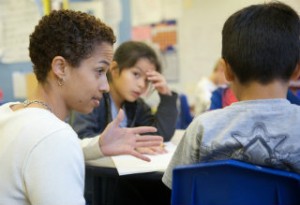What Works Better than Punishment in School

We all know THAT student….
- The one who never brings in their homework finished.
- The student who’s late to class more than they’re on time.
- The student who doesn’t seem to grasp the learning or even appear to care if they look like they’re paying attention or not.
- The student who pulls others off task with their unwanted commentary.
When school staff see this type of student there is often a feeling of disrespect and an automatic response of wanting to make sure the student’s behavior is corrected, and a punishment occurs (e.g.; staying after school, staying in from recess, suspension, expulsion, etc.).
Where we often fail the student is when we don’t work to understand them and then teach them and support a change in their behavior.
In a recent classroom lesson, I had planned a really fun event. I went so far as to build up the idea of this fun event to the class for a week prior to the planned event day. However, the day of the planned event I did not have the materials I needed.
I had to go to the class and let them know our plans weren’t going to happen… Having the privilege of being the person “in charge,” I was able to plan out my next steps. I decided to go into the classroom and share about the events of my morning, a spilled water bottle, grumpy children, and an unexpected consult for a student emergency.
Even though I had planned to get in to work early and finish these tasks, it didn’t work out for me. I had the privilege to explain myself to the class and invite them to empathize with my situation. They did not ask how I would rectify the situation; they did not plan a punishment for me. They simply met my frazzled self with kindness, compassion and thoughtfulness. The next day some of the students even came up to me to check in on how my morning was going.
Even as “the grown ups,” we mess up… just like our students do. When this happens it’s not a punishment that helps to change our behavior. Actually, in many of us, punishment can make us withdraw even more. However, meeting a mistake with compassion, understanding, and an opportunity to rectify the situation serves as a learning opportunity for future change in both children AND adults.
Understanding the student
As we consider behavior, it’s important to think about what might be the cause. Maybe the student is preoccupied each night with caring for younger siblings. Possibly the student’s classes are spread so far apart in the building it’s challenging for them to get to class before the bell.
Maybe the student doesn’t understand the concepts being taught and struggles to keep up. What if the student is lonely and trying their best to figure out how to fit in?
There are so many reasons for behavior. We don’t know those reasons until we investigate by asking, observing, and being open and empathic about the possible outside factors facing this student.
What works best?
Talking with the student about their behavior and showing them you truly care is the one action I’ve seen work best in creating change in behavior. Let’s consider the following:
Leena’s behavior has come up at a staff meeting because she’s failing multiple classes and seems disengaged during class instruction. Staff are frustrated and begin to ask what is going to be done.
► A punishment focus has staff talking about a plan of retribution to make sure Leena knows that if she keeps doing this, she’ll get more and more time in detention.
The problem with this focus is that the punishment doesn’t dig into why the behavior is happening and how to support any type of change. If Leena doesn’t understand the content, she isn’t going to do any better if she is forced to stay at school more and complete work on her own.
► Whereas an approach of “working to understand” has staff asking, who has a close relationship with Leena? What do we know about her life that may be impacting what we are seeing at school? How can we support this need?
This approach will lead us to better understand and consider – maybe Leena has a lot of responsibilities at home and is up late taking care of younger siblings and the household chores, all of which make homework a low priority. Leena may struggle to focus during the day because she’s tired, and maybe she’s always had difficulties academically but is now starting to disengage because the rigor has increased.
Punishment vs. logical consequence
As another option – a step beyond teachers’ understanding – is a consequence that can help in supporting change in future behaviors.
Logical and meaningful consequences to actions are important and can be impactful in changing behavior (Curren, 2020). However, within the school system, we often get stuck in the “equality” of punishment, and there’s a belief that consequences should be the same for all.
There also seems to be a belief that something must be taken away in order “to even the score” and “teach the child a lesson.” You will understand this concept if any of these punishments have been used at your school:
- Loss of recess for unexpected behavior
- After-school detention for being late to class
- Suspensions due to unexcused absence or multiple late-to-class referrals
- Taking away a snack
Of course, there are other examples as well, but the above are commonly seen across schools. This way of thinking in black and white can make logical and meaningful consequences more challenging. However when we also consider Maslow’s Hierarchy of Needs, we’re reminded that children have the basic right to food, water, rest, physical activity, safety, and security (McLeod, 2022).

Punishment cannot work well to support long term change in behavior, especially when it impacts a child’s basic needs. However, utilizing understanding and logical consequences can support rapport as well as behavior change.
When implementing a logical consequence for a student, consider the following:
The consequence is respectful of the student’s dignity.
► The focus is on the behavior (spilling lunch) vs. the child (you are out of control)
► The tone used in explaining the consequence is neutral and not punitive.
When the focus is based on punishment versus a consequence, respect may not be at the forefront, but rather there may be a push for obedience that may also cause resentment.
The consequence is related to the behavior.
► Behavior: Made a mess in the bathroom. Consequence: Clean up the bathroom.
► Behavior: Disrupting the class. Consequence: Leaving the classroom.
When the focus is based on punishment versus a consequence, there is reactivity and a focus on personal vendetta.
The consequence supports the student with an internal understanding of their choices.
► Consider ways to support learning of how to change this behavior in the future.
► Consistency is key, so that they learn whenever they do an unexpected behavior there will be a consequence.
When the focus is based on punishment versus a consequence, there is an external locus of control that things “just happen to me.”
Examples of logical consequences
- A student is consistently speaking out of turn in the classroom.
“You’re showing me that you can’t handle this activity right now with all of the frequent interruptions; you’ll need to complete this work outside of the room on your own.”
- A student makes a mess in the lunchroom.
“Now that you’ve created this mess, you’ll be cleaning up the lunchroom.”
- A student is behind in class work due to absences.
“I see that you’re behind; let’s meet after school today to work through your missing work.”
How to make this change
The next time you’re talking with a colleague, participating in a staff meeting, or simply noticing a student’s behavior, instead of jumping to “how will we punish them,” have these phrases ready.
- I wonder what else may be going on that we don’t see.
- What can be done to make a change in this student’s behavior that will be respectful and help them to understand the need for a change.
- What consequence may help this student to learn and then be less likely to do this behavior again?
Our students need us. When we punish rather than understand and apply logic, students feel alienated (Curren, 2020). We can support this change by continuing to teach our colleagues about the harm and wasted efforts of punishment and the need to design consequences that fit (and support) this student in this situation.
References
McLeod, S. A. (2022, April 04). Maslow’s hierarchy of needs. Simply Psychology. www.simplypsychology.org/maslow.html
Curren, R. (2020) Punishment and motivation in a just school community. Theory and Research in Education (18:1). 117-133. DOI:10.1177/1477878520916089
Katelyn Oellerich, Ed.S. is a school psychologist in Mineral Point, WI in her ninth year and has had experience in both urban and rural settings. Katelyn has presented research focused on Mindfulness and Planning and Organization Skills and has additional training in social-emotional learning, art therapy, trauma sensitive schools, Families and Schools Together, and gender inclusive practices. Katelyn enjoys supporting student engagement by empowering relationships at school. See her MiddleWeb articles here.

































